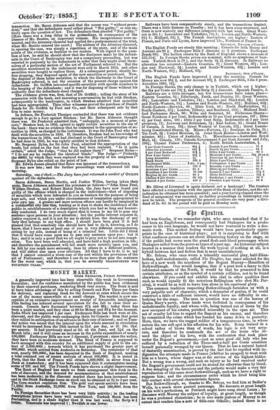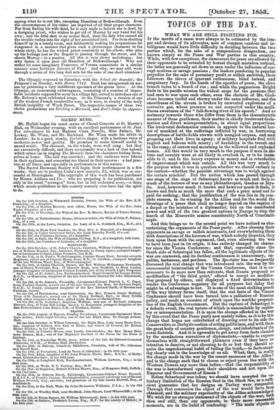CO Quarto.
It was Goethe, if we remember right, who once remarked that if he had been an Englishman, and consequently had Shakspere for a prede- cessor in his own language, he would not have ventured to write a dra- matic work. This modest feeling would have been particularly appro- priate in the case of historical plays ; yet it is surprising to find with what readiness persons can set about illustrating history on the stage, as if the public had never seen the grand flesh-and-blood personages whom Shakspere called from the grave as types of a past age. An historical subject treated in a manner that renders the work typical of nothing at all, is a hybrid between fact and fiction that is most unsatisfactory. Mr. Mous, who once wrote a tolerably successful play, half-Eli7a- bethan, half-melodramatic, called 27e Tempter, has since selected for the hero of a new work the murderer of the Regent Murray—Hamilton of Bothwellhaugh. One would imagine, that if a poet took a fancy to this celebrated assassin of the North, it would be that he presented to him certain attributes, or as the symbol of a certain collision, not to be found elsewhere. If you could not exhibit him clad in other qualities than such as would equally fit the notorious Bellingham who shot Mr. Per- cival, it would be as well to leave him alone in his equivocal glory. The common tradition respecting Bothwellhaugh furnishes us with a very palpable sort of character, which a dramatist of genius, if he could construct a fable of sufficient interest, would have no difficulty in em- bodying for the stage. The man in question was one of the heroes of Queen Mary's party, whose lands were forfeited in consequence of his unfashionable loyalty, and whose wife, being turned out of doors by the new occupant of his estates, perished miserably in the open air. This act of cruelty led him to regard the Regent as his enemy, and therefore he committed the crime which has handed his name down to posterity. Here, then, we have the rugged soldier of a tempestuous time in whose nature the one soft spot is his affection for his wife. Being trained in a school rather of blows than of words, his logic is not very accu-
rate, and therefore he confounds the act of the brute who M- used the object of his love, with the confiscation that took place
under the Regent's government,—just as some good old lady who has
suffered by a reduction of the Three-and-a-half per Cents considers herself personally wronged by our Queen. That he has a natural hatred of dastardly assassination is proved by the fact that he repelled with in-
dignation the attempts made in France (whither he escaped) to treat with him as a bravo, whose dagger was at the service of the highest bidder.
But a wrong was a wrong, and such an injury as he had received under the Regent's government could not be atoned for otherwise than by blood. A due mingling of the ferocious and the pathetic would make a very fair reproduction of this same stout Bothwellhaugh, such as we have a nght suppose him ; and the circumstances under which he lived bring him into contact with several characteristic figures.
But Bothwellhaugh, as, thanks to Mr. &lours, we find him at fiadler's Wells, is a much more genteel personage. He descants at great length on his wife's perfections, as Petrarch might have sung about Laura ; he discusses with Murray the subject of loyalty, at great length, as though he was a professed rhetorician; he is also made jealous of Murray to an extent that renders him a sort of fifth-rate Othello; indeed there is no saying what he is not like,. excepting Hamilton of Bothwellhangh. Even the circumstances of his crime are-deprived of all think proper character. Far from finding his wife dead, he is only made to believe she is dead, by a designing priest, who wishes to get rid of Murray by any hand but his own ; and the fatal shot is no sooner fired, than the lady who causedall the trouble rushes into the sight of her astonished lord. Far from shutting himself up in a lonely room' and deliberately making his preparations for vengeance in a manner that gives such a picturesque character to the whole story, he has the wicked priest constantly at his elbow, who stirs up his feelings just as the Regent is passing through- the street, and he shoots Murray—in a passion. All this is very clever melodrama; but why fasten it upon poor old Hamilton of Bothwellhaugh ? Why not rather let some imaginary Francesco of Verona assassinate in a similar manner some fictitious Antonio of Pisa? And why, we may add, wade through a series of five long dull acts for the sake of one short situation ?



























 Previous page
Previous page